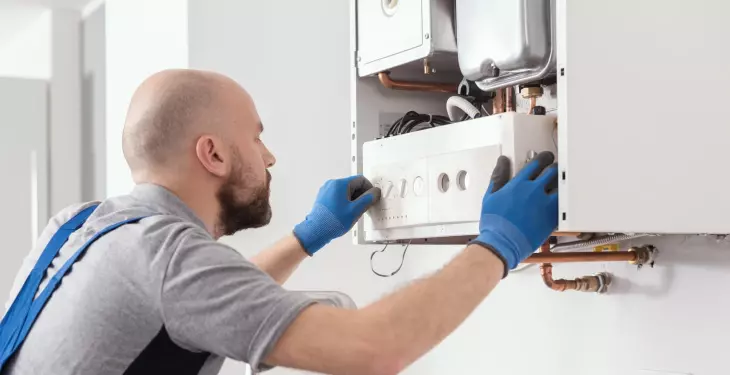

Written by Stephen Day
Gas Safe Engineer
Updated: 19th December, 2025
High boiler pressure is usually anything above 2.5 bar on the pressure gauge when the heating is on.
Get a new boiler quote, save up to £550 per year (0% APR available).
A safe central heating system relies on stable boiler pressure.
When pressure becomes too high the boiler may lock out, radiators can stop heating evenly and the system becomes more prone to leaks or internal component wear.
This guide explains what high boiler pressure is, why it happens and how to lower it safely at home.
A modern sealed heating system needs a set amount of water to circulate through radiators and internal components.
The boiler measures this level using a pressure gauge. When heating is off and everything is cold, the system should sit at about 1.0 to 1.2 bar.
As the boiler heats the water, the pressure rises naturally.
Most boilers reach about 1.5 to 1.8 bar when the radiators are hot.
This rise is normal because water expands when heated.
Pressure is considered too high when it moves close to 2.5 bar while the system is running or if it sits well above 1.5 bar when cold.
Most domestic pressure relief valves open at about 3 bar.
If the system pushes towards this level the valve may release water to protect the boiler.
From iHeat’s experience, boilers that repeatedly climb above the expected range often have an expansion vessel problem, an overfilled system or a filling loop that is letting water through even when closed.
Not sure if your pressure is actually too high? This guide explains what your boiler pressure should be when the heating is off and what to do if it fluctuates.
Homeowners usually spot high pressure when radiators become uneven in heat or the boiler display shows a warning.
The most common causes are below.
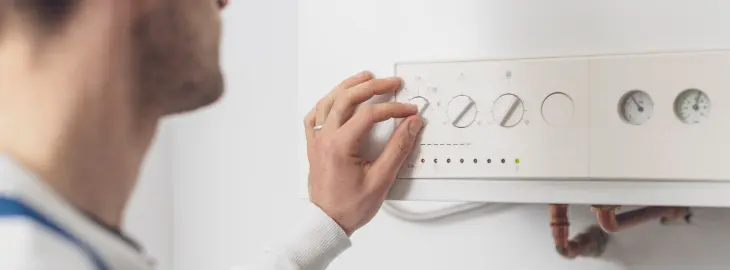
If the boiler has recently been topped up and the filling loop was left open for too long the pressure may have been raised too high.
Even a small increase in cold pressure can result in a large rise when the system heats.
A filling loop left slightly open is one of the most frequent causes of rising pressure we see at iHeat.

The expansion vessel is a small container inside the boiler or system pipework.
It contains a rubber membrane with air on one side and system water on the other.
Its job is to absorb pressure increases when water expands during heating.
Over time the air charge weakens. When this happens the vessel cannot control pressure rises.
The pressure then increases quickly as the boiler heats and may drop sharply when it cools. This pattern often repeats daily.
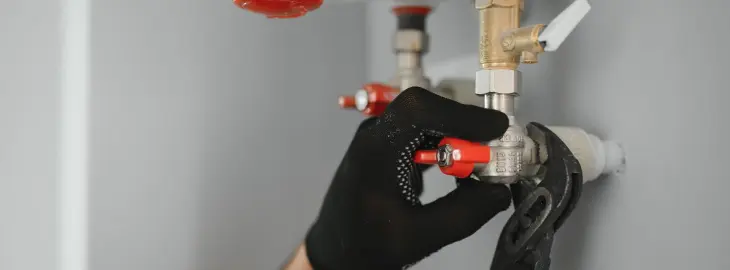
If the system has ever risen too high the pressure relief valve may have opened.
Once it operates it may not reseal perfectly, allowing a small continuous loss of pressure.
This makes homeowners top up frequently which can then push the system too high again.
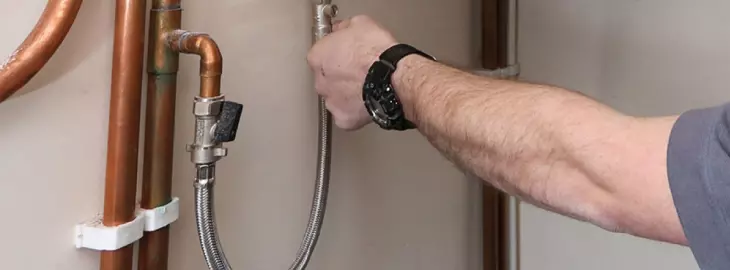
A filling loop links the boiler to the mains supply.
f the internal valve becomes worn it can allow water to pass into the system even when fully closed.
This slowly increases pressure until the boiler rises above its safe range.
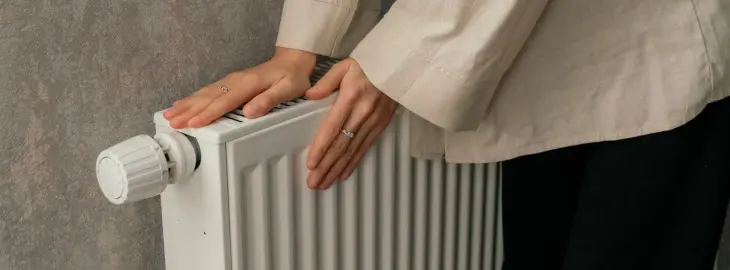
A radiator valve that has been recently replaced or pipework disturbed during renovation can cause pressure imbalance.
Although less common, system alterations can leave trapped air that alters pressure behaviour.
While modern boilers have built-in safety features, many homeowners understandably worry and ask can a boiler explode if pressure is too high?
Look at the pressure gauge on the boiler display. Check it twice:
When the system is cold: After being off for several hours.
When the system is hot: About 20 to 30 minutes after the heating has been running.
If the cold reading sits well above 1.5 bar or the hot reading moves close to 2.5 bar then the system pressure is too high.
Boilers that rise very rapidly within the first few minutes of operation often indicate an expansion vessel problem.
Boilers that creep up slowly over days often have a passing filling loop or pressure relief valve issue.
Most homeowners can lower high pressure safely if the cause is simple overfilling. Use the steps below.

This gives an accurate pressure reading and prevents hot water from escaping during the reduction process.

Confirm both valves are horizontal and not dripping. If either is loose tighten gently. If water continues to pass through, a qualified engineer will be needed.
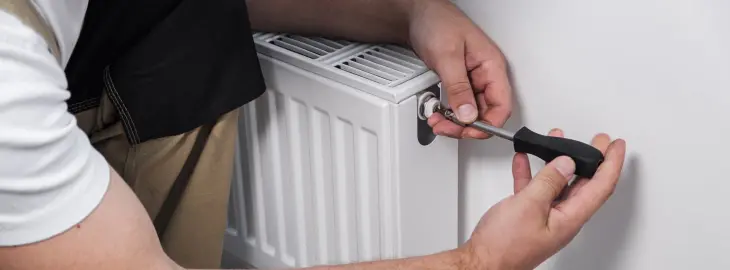
Use a radiator key to open the bleed valve at the top of a radiator. Keep a cloth underneath. Let a small amount of water escape and watch the boiler pressure gauge fall. Stop when the cold pressure reaches about 1.2 bar.
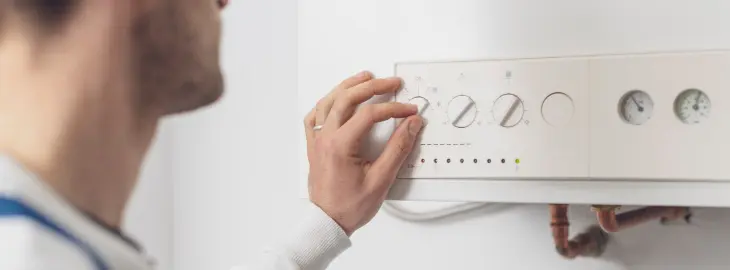
Turn the heating back on. After about 20 minutes the hot pressure should settle around 1.5 to 1.8 bar.
If the pressure climbs close to 2.5 bar again, the issue is unlikely to be simple overfilling.
Symptom | Likely cause | Next step |
|---|---|---|
Cold pressure above 1.5 bar | System overfilled | Release water through a radiator |
Pressure rises close to 2.5 bar when hot | Failing expansion vessel | Engineer inspection |
Pressure rises steadily over several days | Faulty filling loop | Engineer diagnosis |
Water discharging outside | Pressure relief valve open | Engineer replacement |
Repeating pressure rise even after adjustment | Vessel or valve fault | Engineer visit |
If boiler pressure rises too much, it can trigger the pressure relief valve, leading to a leaking overflow pipe near the boiler.
Some pressure faults cannot be fixed safely by a homeowner.
Contact a qualified engineer if:
Pressure rises close to the relief valve level
The system overpressurises within minutes of heating
You smell gas or see water discharging outside
You have to drain water frequently to keep pressure safe
The boiler locks out repeatedly due to high pressure
Engineers will test the expansion vessel using a standard pressure gauge, inspect the relief valve for signs of passing and check the filling loop for internal wear.
These checks require the boiler casing to be removed which only a qualified engineer can carry out safely.
During a service, engineers check the expansion vessel charge, test the relief valve, inspect system seals and ensure the internal pump is running correctly.
Regular servicing keeps pressure stable, reduces wear on internal components and prevents most pressure related faults.
For homeowners, simple maintenance helps too.
Check pressure monthly when the system is cold and avoid topping up frequently as this can dilute inhibitor and increase the risk of corrosion.
Last updated: 19th December, 2025

Written by Stephen Day
Gas Safe Engineer at iHeat
Stephen Day is a Gas Safe registered and FGAS certified engineer with over 20 years of hands-on experience in the heating, cooling, and renewable energy industry, specialising in boiler installations, air conditioning, and heat pump systems.
LinkedInArticles by Stephen Day are reviewed by iHeat’s technical team to ensure accuracy and reliability.

19th February, 2026
Selecting the appropriate boiler for your London home involves understanding the different...
 Read Article
Read Article

19th February, 2026
A typical Annual Boiler Service includes a visual inspection to identify any obvious fault...
 Read Article
Read Article

19th February, 2026
Boiler servicing comprises a set of inspections and tests conducted by a qualified enginee...
 Read Article
Read Article
No obligation. Takes less than 60 seconds.